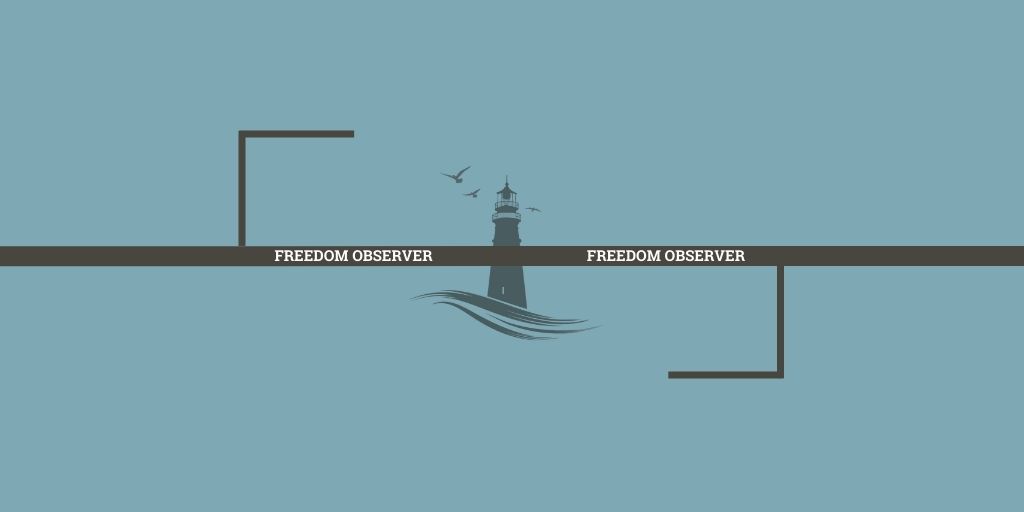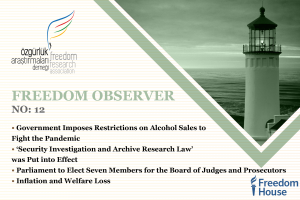
From Editor-in-Chief
The campaigns of political parties and party alliances for the presidential and parliamentary elections to be held in mid-May are drawing to a close. Despite the campaigns conducted by the AKP-MHP alliance, challenging the honest and equal election conditions, and violating almost all relevant moral principles, as the election process progresses, the chance of winning the double election of the Table for Six led by CHP and İYİ Party increases. President Erdogan and his party’s application of an electoral economy and a series of unrealistic promises that sometimes push the limits of imagination leave their mark on this election process.
Parallel to this, from time to time during the election process, there are some events that confirm the concerns based on previous experiences that the power race between the ruling and opposition parties will not run under the conditions of fair competition. As a matter of fact, those who occupy public positions, especially the President himself, continue to use state facilities, especially TRT, in a way that takes advantage of themselves or their parties. Meanwhile, unfortunately, we are witnessing some developments confirming the widespread expectation that the Supreme Election Council (YSK), which is supposed to ensure that the electoral process runs in equality and fairness, will not fulfill its duties accordingly and will probably favor the ruling parties.
We see the most recent example of this in the Supreme Election Board’s legally controversial decision rejecting the objections from the opposition that it is unconstitutional and unlawful for the ministers to be candidates for parliament without leaving their posts officially. In the meantime, although the YSK rejected the request of the representatives of the government to remove the phrase “Nation Alliance” on the ballots to be used in the elections, the high number of members opposed to the decision shows that a strong tendency in favor of the ruling bloc continues to exist in the Council.
On the other hand, the AKP-MHP government does not show any positive signs of getting the economy in a deep stalemate and getting it back on track, even though the elections are less than two weeks away. In fact, surprisingly, from time to time, the government makes statements that deny or belittle the existence of the economic crisis, which makes life extremely difficult for segments of society with limited and fixed incomes. The fact that the Central Bank has ceased to be an administrative authority that can act independently of the government also plays an important role in the economic crisis.
Indeed, the AKP-MHP government has abolished the independence of the Central Bank, reducing it to an ordinary tool at the government’s disposal. The institution’s recent decision on monetary policy, reviewed below, is a recent example confirming this. This incident shows that although it is a requirement of its own job description to act independently, the Central Bank bases itself on the instructions and preferences of the political power, not the requirements of the discipline of economics, as a guide while performing its duty.
Despite everything, it is hoped that the elections to be held on May 14 will bring a result that will start the process that will lead our country out of the multifaceted and deep crisis that the AKP-MHP administration has dragged into it. Turkey urgently needs an institutional restoration to stop this regression and lay the groundwork for a comprehensive reformist breakthrough.
Stay tuned to meet again after the elections.
* Prof. Dr. Mustafa Erdoğan
Supreme Election Board has decided that Ministers can be candidates for parliament without resigning
The current 16 ministers and Vice President Fuat Oktay became candidates for the Justice and Development Party in the general parliamentary elections to be held on 14 May 2023. However, these people did not resign from their posts. According to Article 76 of the Constitution, public officials cannot be candidates for parliament unless they resign from their duties. The third paragraph of Article 76 is as follows: “As long as judges and prosecutors, members of higher judicial bodies, faculty members in higher education institutions, members of the Council of Higher Education, civil servants of public institutions and organizations, and other public officials who are not workers in terms of their services, and members of the Armed Forces, resign from their duties they cannot be candidates and cannot be elected as members of parliament.”
Similarly, in Article 18 of the Law on Elections of the Deputy No. 2839, titled “Persons to be resigned for candidacy”; “Judges and prosecutors, members of higher judicial bodies, faculty members in higher education institutions, members of the Council of Higher Education, Radio and Television Supreme Council, civil servants of public institutions and organizations and other public officials who are not workers in terms of their services, mayors who want to be candidates and officers and non-commissioned officers, the chairman and members of the provincial and district administrative boards and members of the municipal councils of the political parties that want to be candidates, the members of the provincial council, the professional organizations in the nature of public institutions and the trade unions, the public banks and the higher organizations and their enterprises or partnerships in which they participate are subjected to the rule that if a decision is made to renew the election one month before the start of the general and by-elections, those who take charge in the board of directors and supervisory boards cannot put forward their candidacy and cannot be nominated unless they want to leave their posts within seven days of the announcement of the renewal decision.’’
Based on these provisions, many objections were made to the YSK on the grounds that the vice president and ministers were nominated without resigning. According to media reports, the YSK rejected these objections.[1] The said decision of the YSK was not published in the Official Gazette and on the Board’s website. However, it is understood from the media reports that the decision of the YSK was based on the justification that the ministers were not public officials. In the YSK decision, it was emphasized that the Ministers were not counted in Article 18 of the Law No. 2839, and it was reminded that they took an oath in the Grand National Assembly of Turkey when they took office, and it was concluded that the appointed Ministers did not need to resign in order to become a parliamentary candidate. However, it should be noted that this decision is open to discussion and negatively affects the fairness of the election.
First of all, it should be noted that the status of ministers has completely changed after the 2017 Constitutional Amendment. Ministers are no longer political personalities and members of the executive branch, but are the administrative agents of the President, who is the executive organ. In other words, it is necessary to explain how the ministers who do not need the vote of confidence of the legislature to take office and cannot be dismissed by the Grand National Assembly of Turkey, who are directly responsible to the President, are not counted in the category of other public servants who are not workers in terms of their services. It is not possible to understand how the fact that the ministers took the oath in the Grand National Assembly of Turkey when they were taking office excludes them from the scope of public servants. The reason why ministers are not listed separately in Article 18 of the Law No. 2839 and 76 of the Constitution is clear. It is in accordance with the nature of the parliamentary system that ministers who were elected deputies and political figures before the 2017 amendment did not resign. However, the legal status of the ministers was not regulated during the transition to the presidential government system. In this case, there is no rule stipulating that they should be exempted from the status of public servant.
On the other hand, the fact that the ministers do not resign makes it difficult for the elections to be held in a fair competition environment. Ministers make unlimited use of public resources and exercise their public powers during the election campaign period. Law enforcement officers affiliated to the Minister of Interior, who is a parliamentary candidate himself, carry out operations against the candidates of other political parties, and prosecutors under the control of the HSK, headed by the Minister of Justice, who is also a parliamentary candidate, can open investigations.
* Ali Rıza Çoban – Constitutional Lawyer
[1] https://www.haberturk.com/ysk-muhalefetin-basvurusunu-reddetti-3584112
Once Upon a Time: The Central Bank
On April 27, 2023, the Central Bank of the Republic of Turkey Monetary Policy Committee (PPK), which is the sole authority on Turkey’s monetary policy, convened. In yesterday’s meeting, the Central Bank kept the one-week repo rate, which is used as the policy rate, constant at 8.50%. So, it didn’t actually change it. This attitude was also predicted in the surveys conducted before the decision. In the statement of the PPK decision, it was emphasized that the interest rate was kept constant in order to ensure that the financial conditions were supportive after the earthquake. Of course, despite everything, the Board reconsidered the part that it repeats in every PPK decision: “The Central Bank will continue to use all its instruments resolutely within the framework of the Liraization strategy until strong indicators pointing to a permanent decline in inflation emerge and the medium-term 5 percent target is achieved in line with the main objective of price stability”. We do not want to go into the details of this issue, as we have previously discussed the details of the Liraization strategy and its results in the previous bulletin.[1]
The main issue that we should pay attention to, regardless of the content of the meeting, is that this meeting is a very clear expression of the collapse of institutions in Turkey. Decisions on monetary policy affect the course of the economy in all countries where institutional capacity is not so destroyed. But our central bank has deactivated the most powerful tool at its disposal in accordance with political instructions. The Central Bank now takes decisions under the title of “macro precautionary measures” that do not quite fit the spirit of monetary policy.
On the other hand, the issue of monetary policy cannot be evaluated only in terms of democratic institutions. Of course, the stances of central banks may reflect the democratic preferences of countries. But this does not always have to be the case. Putin showed us a recent example of this. In his annual “State to the Nation” speech on 07.01.2022, Putin stated that they should reach the 4 percent inflation target in the economy and expressed that the expansionary monetary policy adversely affected macro-economic policies. He responded to the criticisms of the central bank as follows: “Of course you can scold the head of the Central Bank. I am in constant communication with the real sector. I know the arguments they accuse the Central Bank of. The real sector does not like interest rate hikes. But if we do not do this, we may end up like Türkiye. The real problem is here. This is an important issue and a challenge. Of course, we must be careful when using this instrument, but the Central Bank’s policies are independent. It may seem strange to you, but I do not interfere with the Central Bank.”[2]
Even an autocratic leader like Putin accepts some preconditions of the economy and does not resist them. But our central bank and the politicians who are its real managers ignore even this basic fact. Their sole purpose is to prevent the rise in the dollar until the election is over. But they have not been able to do this fully. Let this be the main topic of the next Bulletin.
* Enes Özkan – Economist, Istanbul University
2https://www.tcmb.gov.tr/wps/wcm/connect/en/tcmb+en/main+menu/announcements/press+releases/2023/ano2023-17
[2]Euronews Youtube Channel: https://www.youtube.com/watch?v=-tN0N-06IkI
YSK Decisions
The Presidential and Parliamentary elections, which will be held on May 14, are a critical turning point for Turkey in many respects. After the elections, regardless of the results, dramatic changes await us in the country’s economic and political situation. Parties that are aware of the risks and spend all their energies on setting the agenda. While the AKP follows a political and economic populist election strategy, opposition parties are running a more constructive campaign targeting the votes of “median” voters. In all this turmoil, the parties are trying to implement other methods that can affect the election results as well as the struggle on the field. Chief among these is influencing the decisions of the YSK regarding the implementation of the election and the creation of ballots.
For this purpose, the AKP representative of the YSK, Recep Özel, made an application to the YSK. In this application, he requested that the phrase Nation Alliance should not be included in the ballot papers on the grounds that the 4 political parties within the Special Nation Alliance did not submit a list of candidates, and the CHP and IYI Party did not submit a candidate list in some electoral circles, on the other hand, they did not submit an additional protocol to change the alliance protocol. In the application, he stated that with the removal of the Nation Alliance from the ballots, the calculation of the election threshold should be done separately for each political party. Evaluating the application, the YSK stated that “although the Democracy and Atılım Party, Democratic Party, Future Party and Felicity Party, which are all members of the Nation Alliance, have not nominated candidates in any electoral districts, the CHPand the İYİ Party, which are the other parties in the alliance, are in the provinces. The YSK rejected this application by a majority, saying, “The request that the Nation’s Alliance continues and that the alliance protocol is invalid because the CHP and İYİ Party has nominated candidates for more than half of the total of electoral districts.” YSK chairman Ahmet Yener and three other members voted “against” this decision.
Although the YSK’s rejection of the AKP representative’s request to remove the phrase Nation Alliance from the ballot papers is positive in terms of establishing fair competition, the fact that four members voted for the acceptance of this obviously unfounded demand raises concerns about the decisions to be taken by the YSK, especially on the election day and after. Considering the decisions that the YSK has hindered the democratic process in the past months and especially in the 2019 local elections, considering the benefit of the AKP, we can say that the way to win this election is not only through the ballot boxes, but also through the decisions of the YSK. In this respect, the members of the YSK, who are supposed to be impartial, have a great responsibility in this election.
* Ömer Faruk Şen – Ph.D. – Missouri University





